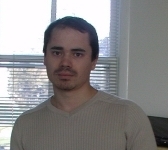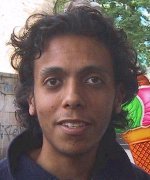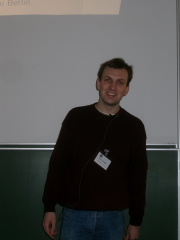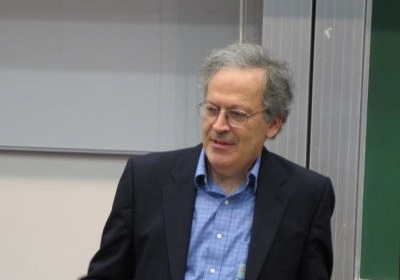FoCS Archive News - Before Sept 20
Maxim Sviridenko joins the Department of Computer Science as a new Professor

Maxim Sviridenko joins the Department of Computer Science as a new Professor in January 2012.
Maxim obtained his PhD in Applied Mathematics and Computer Science in 1999 from the Sobolev Institute of Mathematics and Novosibirsk State University. Then he spent two years as a post-doc at University of British Columbia in Vancouver, Aarhus University, and IBM T.J. Watson Research Center in Yorktown Heights, before becoming a Research Staff Member at IBM T.J. Watson Research Center in Yorktown Heights in December 2001.
Maxim's primary research interest lies in the area of the design and analysis of algorithms for discrete optimization problems. He published over 50 papers in top Computer Science, Operations Research and Discrete Mathematics journals and conferences. He designed several algorithms with best known performance guarantees for such classical optimization models as traveling salesman problem, generalized assignment problems, submodular maximization, multi-dimensional bin packing problems, job shop scheduling with various objective functions, and other inventory and supply chain management problems. He has been also working on the design of practical algorithms and modeling of the optimization problems arising in practice.
For more information about Maxim's research please visit his IBM homepage.
Welcome Matthias Englert! New Assistant Professor of Computer Science
Dr Matthias Englert , who was a post-doc with the FoCS group in the last three year, since September 2011 joined our department as a new Assistant Professor.

A short bio:
Matthias received his undergraduate degree in Computer Science at the TU Dortmund and then his PhD in Computer Science in 2008 from the RWTH Aachen University, Germany. In 2008 he won the prestigious EPSRC Postdoctoral Research Fellowship in Theoretical Computer Science, hosted by our department in Warwick; title of his project was »Randomisation in Online Algorithms, Load Balancing and other Dynamic Problems«. In September 2008, he joined the FoCS group at the Department of Computer Science and DIMAP at the University of Warwick as a Postdoctoral fellow.
His current research interest lies in Theoretical Computer Science, in the area of the analysis of algorithms, more precisely in online algorithms, metric embeddings, load balancing, probabilistic input models, and algorithmic game theory.
For more information please see his page at http://www.dcs.warwick.ac.uk/~englert/ ... or stop by in his office CS2.23.
Amin Coja-Oghlan receives ERC Starting Grant
 Dr Amin Coja-Oghlan, a FoCS member and Associate Professor (Reader) in the Department of Computer Science and Warwick Mathematics Instititue, has been awarded the ERC Starting Grant.
Dr Amin Coja-Oghlan, a FoCS member and Associate Professor (Reader) in the Department of Computer Science and Warwick Mathematics Instititue, has been awarded the ERC Starting Grant.
ERC Starting Grant is one of the most prestigious grants awarded by the European Research Council for world-class researchers, and Amin is one of the very few researchers in Warwick to receive this grant. His new ERC Starting Grant, worth over a million of euros for the period of five years, has been awarded for his project »Phase Transitions and Computational Complexity«.
Dr Coja-Oghlan's main research area is in the Theoretical Computer Science, with special focus on the study of Algorithms and Complexity via rigorous mathematical methods, on the boundary of computing, combinatorics, and probability. He published pver 30 papers in refereed journals (eight as a sole author) and a similar number of papers in the proceedings of international Computer Science conferences. He is the winner or the EATCS Award for the best paper in Track A at the 36th International Colloquium on Automata, Languages and Programming (ICALP 2009), and he has been an invited speaker at numerous international conferences in computer science and in mathematics.
Alumnus wins ACM Turing Award

ACM has named Leslie G. Valiant of Harvard University the winner of the 2010 ACM A.M. Turing Award
 for his fundamental contributions to the development of computational learning theory and to the broader theory of computer science. Valiant brought together machine learning and computational complexity, leading to advances in artificial intelligence as well as computing practices such as natural language processing, handwriting recognition, and computer vision. He also launched several subfields of theoretical computer science, and developed models for parallel computing. The Turing Award, widely considered the "Nobel Prize in Computing," is named for the British mathematician Alan M. Turing. The award carries a $250,000 prize, with financial support provided by Intel Corporation and Google Inc. Les Valiant received his PhD in Computer Science from the University of Warwick in 1974. His PhD supervisor was Professor Mike Paterson.
for his fundamental contributions to the development of computational learning theory and to the broader theory of computer science. Valiant brought together machine learning and computational complexity, leading to advances in artificial intelligence as well as computing practices such as natural language processing, handwriting recognition, and computer vision. He also launched several subfields of theoretical computer science, and developed models for parallel computing. The Turing Award, widely considered the "Nobel Prize in Computing," is named for the British mathematician Alan M. Turing. The award carries a $250,000 prize, with financial support provided by Intel Corporation and Google Inc. Les Valiant received his PhD in Computer Science from the University of Warwick in 1974. His PhD supervisor was Professor Mike Paterson.
Alexander Tiskin and Peter Krusche engage in interdisciplinary research with Warwick biologists
Mike Paterson and Uri Zwick's article on 'Overhang' wins prize at Mathematical Association of America
The MAA has awarded Mike Paterson and his collaborator Uri Zwick the Lester R. Ford Award for their article Overhang in the American Mathematical Monthly. The problem of how far off the edge of a table one can reach by stacking n identical blocks first appeared in the American Mathematical Monthly in 1923. A classical solution achieving an overhang logarithmic in n was widely believed to be optimal. The article clarifies the problem and shows that the overhang can be made exponentially larger than this.
Rajagopal Nagarajan gives an invited talk in Tokyo
Rajagopal Nagarajan gave an invited talk at the Hypercomputation Workshop (Hypernet '10) held in conjunction with the 9th International Conference on Unconventional Computation (UC 2010)
held in conjunction with the 9th International Conference on Unconventional Computation (UC 2010) in Tokyo, Japan, 21-25 June, 2010. His talk was titled Formal Methods for Quantum Information Science. A paper based on this work has been accepted to the special issue of the International Journal of Unconventional Computation.
in Tokyo, Japan, 21-25 June, 2010. His talk was titled Formal Methods for Quantum Information Science. A paper based on this work has been accepted to the special issue of the International Journal of Unconventional Computation.
